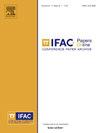随机抛物型系统的状态估计:一种两步估计方法
Q3 Engineering
引用次数: 0
摘要
针对一类随机抛物型系统,提出了一种新的基于两步区间估计的状态估计方法。引入峰对峰分析,解决了由于时空特征和多维性所带来的困难。基于两步区间估计方法,得到了系统状态数学期望的自适应阈值。通过数值仿真验证了该方法的有效性。本文章由计算机程序翻译,如有差异,请以英文原文为准。
State estimation for stochastic parabolic systems: A two-step estimation method⁎
This paper proposes a novel two-step interval estimation-based state estimation scheme for a class of stochastic parabolic systems. Peak-to-peak analysis is introduced to solve the difficulties generated by the spatiotemporal characteristic and the multidimensional nature. Based on the two-step interval estimation method, the adaptive thresholds of the mathematical expectation of the system state are obtained. Numerical simulation is adopted to show the effectiveness of the proposed method.
求助全文
通过发布文献求助,成功后即可免费获取论文全文。
去求助
来源期刊

IFAC-PapersOnLine
Engineering-Control and Systems Engineering
CiteScore
1.70
自引率
0.00%
发文量
1122
期刊介绍:
All papers from IFAC meetings are published, in partnership with Elsevier, the IFAC Publisher, in theIFAC-PapersOnLine proceedings series hosted at the ScienceDirect web service. This series includes papers previously published in the IFAC website.The main features of the IFAC-PapersOnLine series are: -Online archive including papers from IFAC Symposia, Congresses, Conferences, and most Workshops. -All papers accepted at the meeting are published in PDF format - searchable and citable. -All papers published on the web site can be cited using the IFAC PapersOnLine ISSN and the individual paper DOI (Digital Object Identifier). The site is Open Access in nature - no charge is made to individuals for reading or downloading. Copyright of all papers belongs to IFAC and must be referenced if derivative journal papers are produced from the conference papers. All papers published in IFAC-PapersOnLine have undergone a peer review selection process according to the IFAC rules.
 求助内容:
求助内容: 应助结果提醒方式:
应助结果提醒方式:


